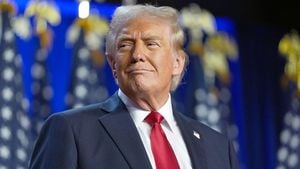President-elect Donald Trump is making waves with the announcement of his Cabinet appointments—a move brimming with intent to fulfill his pledge of putting "America first." Following his recent electoral victory, Trump is doubling down on his campaign promises by assembling what many see as both loyal supporters and controversial figures for key positions within his administration.
Among the notable selections is Pete Hegseth, the television host and former Army National Guard member, who is set to be nominated as Secretary of Defense. Hegseth, known for his staunch conservative views and outspoken criticism of diversity initiatives within the military, has not held any governmental role prior to this. Trump described Hegseth as "tough, smart, and a true believer in America First" and expressed confidence in his ability to revitalize the U.S. military, stating, "Our Military will be Great Again, and America will Never Back Down." Meanwhile, analysts have expressed concerns over Hegseth's lack of experience, emphasizing the need for rigorous scrutiny during the Senate confirmation process.
Adding to the team, Florida Senator Marco Rubio has been tapped as Secretary of State. Not only does Rubio bring extensive experience, having served on the Senate committee overseeing foreign relations, but his relationships across party lines might facilitate smoother Senate confirmations. His advocacy for strong U.S. support abroad, particularly concerning China and Ukraine, aligns well with Trump's aggressive foreign policy stance.
Trump's selection of former Congresswoman Tulsi Gabbard as Director of National Intelligence is similarly garnering attention. Gabbard, once part of the Democratic party and known for her controversial views on U.S. interventionism, especially concerning Syria, is poised to bring her unique perspective to national security matters. Trump publicly endorsed her for the role, stating, "I know Tulsi will bring the fearless spirit... to our Intelligence Community." This pick is seen as part of Trump's strategy to have his team echo his skepticism about foreign intervention.
The appointments also reflect Trump's apparent preference for loyalty over conventional qualifications. Many of his selections were chosen for their vocal support of Trump and engagement during his campaign, raising eyebrows among critics who argue such favoritism may not serve the administration—or the country—effectively. John Bolton, Trump's former national security adviser, has criticized this approach, arguing it indicates not just loyalty but a certain expectation of fealty, or subservience, from aides.
Other notable names being floated for key positions include Rep. Matt Gaetz for Attorney General and Michael Waltz as National Security Adviser. Gaetz's appointment is anticipated to exert considerable influence over the Justice Department, potentially steering investigations away from political adversaries, consistent with Trump’s previous administration dynamics.
With the urgency of the transition process, Trump has announced nearly two dozen Cabinet nominations since his win. His strategy marks a stark difference from his 2016 approach, as he seeks to fill positions at breakneck speed to prepare for his administration's immediate priorities. Spokeswoman Karoline Leavitt emphasized this, stating Trump’s selections embody his commitment to implement his campaign promises as quickly as possible.
While many of the nominees are viewed favorably within Trump’s base, their confirmations may face tough hurdles. Concerns about qualifications and political ideologies are expected to dominate discussions as the Senate gears up for confirmation hearings. Democrats have already expressed their intent to call for thorough evaluations of each nominee's qualifications.
The speed at which Trump is appointing key personnel suggests he is eager to enact policies reflective of his "America first" mantra, addressing both domestic concerns and potential foreign policy reviews. This urgency is underscored by the wide-ranging issues awaiting his administration, from conflicts involving Ukraine and Israel to China’s rising influence.
Trump’s approach could very well reshape the dynamics of U.S. governance and foreign relations over the coming years. With these picks, he signals not only his intended focus areas but also his reliance on those who have shown unwavering loyalty to him through thick and thin.
Trump's Cabinet, comprising diverse figures, reflects not only his loyalty strategy but also the consolidation of his political agenda, which may provide insight on the administration's direction as it seeks to position the United States firmly on its chosen path.



